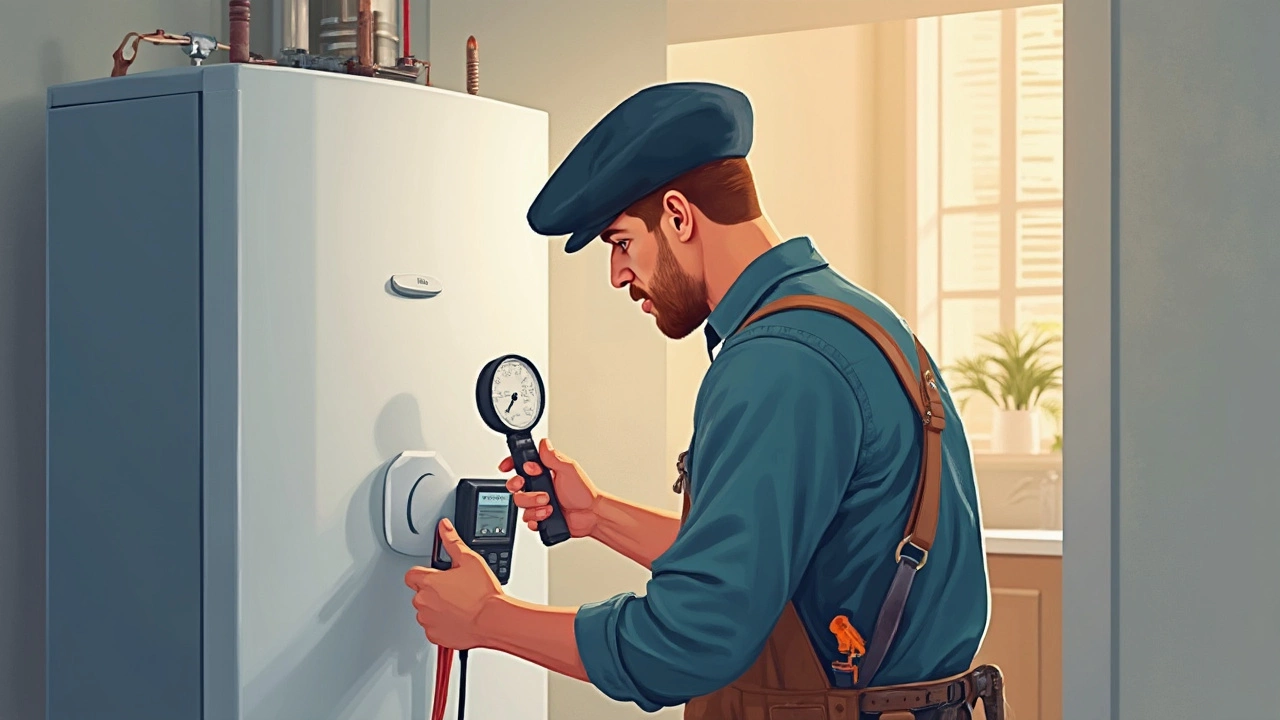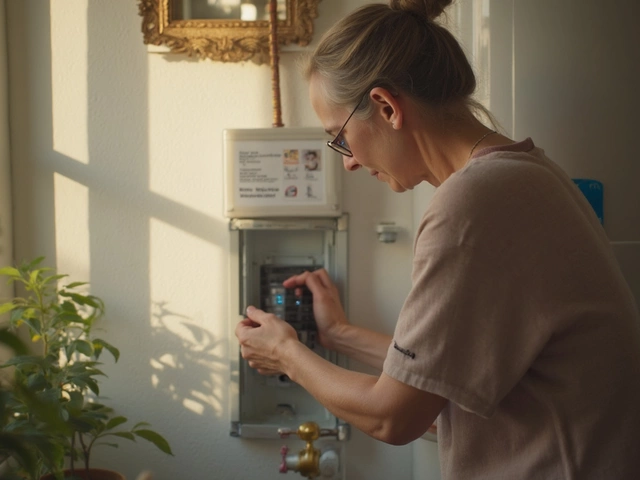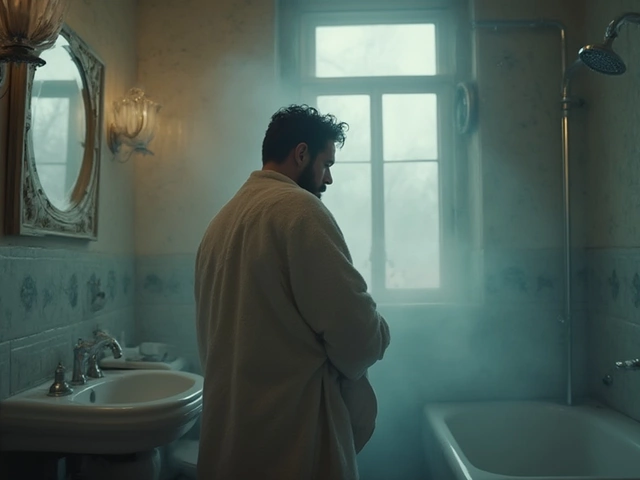Ever been caught off guard in the middle of a shower when the water suddenly turns icy cold? Yeah, not fun. If your water heater's delivering hot water that’s as consistent as sketchy Wi-Fi, it might be trying to tell you something. Check if it's having temperature swings or if it takes an eternity to even warm up the water.
Now, let's talk about odd noises. You know that banging or popping sound isn't the ghost of water heaters past. It's more likely sediment buildup at the heater's bottom, causing your trusty appliance to grumble and rumble. Next time it sounds more like a rock concert, it's time to listen—you don't want a breakdown at the worst moment.
- Temperature Troubles
- Strange Noises
- Rusty Water Warning
- Leaking All Over
- Age Matters
- Decrease in Efficiency
Temperature Troubles
If you find yourself hopping around your shower faucet trying to dodge blasts of hot and cold water, that's a big sign your water heater is on the fritz. The whole point of a water heater is consistency, right? When it can't maintain the right temperature, it's not doing its job properly.
There are a couple of key reasons this might happen. The most common culprit? A faulty heating element. These are like the kitchen stove burners of your water heater, and if one's not working, you're going to get uneven heating. Replacing them is pretty straightforward, but you’ll want a pro to tackle it unless you're a seasoned DIYer.
Don't forget about the thermostat either. Just like the one controlling your living room comfort, if this guy's misreading the water’s temp, it might lead to a weird mix of scalding and freezing water.
Another sneaky factor could be sediment buildup inside the tank. Especially if you’ve got hard water (loaded with minerals), deposits can insulate the water from the heat, leaving you shivering. Flushing out the tank every year or so can prevent this, making sure your heater's operating at its best.
Temperature issues are also more common in older units. An old water heater might just not have the energy efficiency that newer models boast. If it's been a decade or more since it was installed, it might be time to consider a replacement.
| Possible Issues | Solution |
|---|---|
| Faulty Heating Element | Replace heating element |
| Erratic Thermostat | Calibrate or replace thermostat |
| Sediment Buildup | Flush the tank |
| Aging Unit | Consider replacing |
Strange Noises
So your water heater's putting on a noisy show, and it’s not just the pipes playing tricks on you. Those weird banging or popping sounds aren't there to provide entertainment; they’re a real concern. This noise usually stems from sediment buildup inside your heater's tank. When sediment collects at the bottom—and it will, especially if you have hard water—the heating element burns it. This is what creates the loud popping sounds you're hearing.
The good news? This doesn't mean you need to ditch the whole unit just yet. Flushing the heater can often give it a new lease on life. If you're the DIY type, it’s a task you can tackle with a hose and a bit of know-how. Just make sure to turn off the power and water supply before you start.
But if the noise persists even after a flush, it might be routing for the exit. Constant noise can point to the heating element beginning to fail or worse, the tank being in the twilight of its life. If your water heater has become a regular concert venue, it’s time to consider a check-up—or even a replacement—before the situation gets dire.
Rusty Water Warning
Ever noticed a rust-colored tint swirling in your tap water? That's not a new drink flavor. It could be a sign that your water heater is heading for a retirement party, whether it wants to or not. Rust inside your water heater tank can creep into your water supply, especially when the tank is old or the sacrificial anode rod—which prevents rust—has worn down.
This problem often happens because water heaters are made of steel and have an interior lining of glass. Over time, that lining can crack, letting water and steel mix more than they should. This means rust doesn't just stay hidden, and once it makes a home, it can cause leaks and even bigger problems.
If the rust only appears in hot water, it might be the water heater itself. But if you see rust in both hot and cold water, your home’s plumbing might be the culprit. To keep your water supply clear, check things out sooner rather than later.
Here's a quick way to test: Fill a few buckets with hot and cold water. If rust is only in the hot water bucket, then your faulty water heater needs attention. An option is to drain and flush the heater to remove sediment and rust, but if your tank is older—say more than a decade—it might be smarter to think about replacing it.
Keeping an eye out for rusty water not only helps you steer clear of unexpected cold showers but also extends your water heater's life. Regularly schedule maintenance and think about replacing parts like the anode rod every few years to keep rust under control.

Leaking All Over
Imagine stepping into your basement or utility room only to find it looks more like a kiddie pool than a storage space. Yeah, that's not a day anyone wants to have. If your water heater is leaking, it’s a pretty clear sign that something's gone wrong. Leaks can happen for a bunch of reasons, and catching them early can prevent bigger headaches down the road.
One big reason for leaks is a faulty valve. The pressure relief valve, also known as the T&P valve, can give out. It’s designed to release excess pressure, but if it’s damaged or corroded, it might leak water. Then there's the tank itself—rust and sediment buildup can cause wear and tear inside, leading to cracks and leaks.
"Ignoring a leaking water heater can lead to severe water damage in your home, costing thousands in repairs," warns Home Improvement expert Tom Wilson.
Check other connections and fittings around your heater. Sometimes it's the simple stuff, like a loose pipe fitting or a hose, that's letting water slip out. Quick fixes now don't just keep your feet dry—they can extend your heater's life.
So what should you do if you spot a leak? First, turn off the power supply to your water heater to prevent any mishaps. If it's an electric heater, switch it off at the breaker, or turn off the gas if it’s gas-powered. Next, shut off the water supply. This prevents further water from pouring out and causing more trouble.
If you're able to pinpoint the leak, you might be able to snag a DIY repair, like tightening a connection. But if the tank's gone bad or it’s all corroded, it’s time to call in the pros to consider a replacement.
Age Matters
Ever look at your trusty old water heater and wonder how long it's been hitching a ride in the corner of your garage or basement? Like that vintage car in the driveway, its age can reveal a lot about when it might conk out. Most water heaters start showing signs of wear after about 8 to 12 years. So, if you’ve got one that's been around longer than that, it might be time to start scouting for a new one.
How can you tell its age if you tossed the manual long ago? Peek at the manufacturer's sticker on the side. It's usually some cryptic code with numbers and letters, but patience, my friend—typically, the year of manufacture is coded within. Knowing this can help you decide whether it’s worth spending on repairs or better to get a shiny new model.
Manufacturers often recommend keeping water heaters for about 10 years. Once you hit that mark, you'll probably notice your energy bills creeping up, as these older units tend to lose efficiency. If it feels like you're forking over more to heat your water, it might be because the heater is guzzling more energy to do its job.
If you're still unsure whether your water heater is officially 'old' or just a bit seasoned, consider this: newer models are not just more efficient, but come with features like better insulation and digital displays that offer easy control over settings. Sure, change can be daunting, but a little upgrade can make a big difference.
Decrease in Efficiency
Alright, so you're noticing that your power bill's creeping up, but the hot showers haven't gotten any longer or better. Your water heater might just be slacking off. Efficiency drop is a classic sign your heater is struggling.
How does it happen? Well, over time, sediment can build up inside the tank. It’s like your heater trying to work through a crowded room at a party, slowing it down. This sediment acts as an unwanted insulation layer between the burner and the water, making the heater use more energy to heat the water properly.
Another thing to check is the thermostat’s settings. If the heater’s temperature settings aren’t aligned with your actual hot water needs, you’re unnecessarily cranking up energy usage without reaping any real benefit.
Let's put some perspective here. According to some recent stats, a water heater nearing the 10-year mark might lose up to 10-20% in efficiency due to these sediment and wear issues. This not only cranks up utility bills but can also lead to unexpected cold showers.
- Tip: Flushing your water heater tank annually can reduce sediment buildup and keep it running smoother for longer.
- Tip: Consider using an insulating blanket around the heater, especially if it's located in a colder part of your home. It helps in retaining heat, thus improving efficiency.
Just remember, keeping an eye on efficiency isn’t just about avoiding cold showers. It’s about saving money and giving your heating system some extra care to prolong its lifespan.





